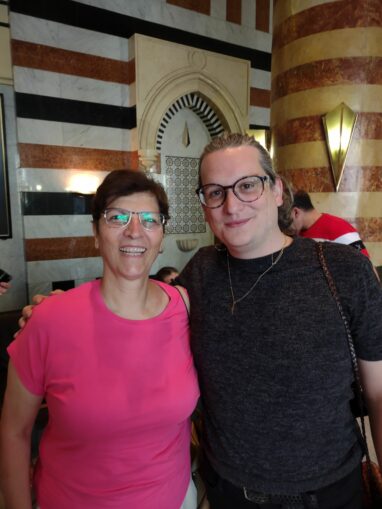After the First Intifada: ‘Prisoners build their own weapons of defense and strength’
Dr. Amal Wahdan is the founder and editor of the Arab Gazette, as well as an organizer with One Democratic State of Palestine (odspal.net). She was a member of the International Delegation to the 2021 Syrian Presidential Election, as was Ted Kelly, who interviewed Dr. Wahdan July 14.

Dr. Amal Wahdan and Ted Kelly in Damascus, Syria, May 28, 2021.
Workers World: You yourself were a political prisoner. Could you talk about your experience in Israeli custody?
Amal Wahdan: It all started with the First Intifada in 1987 and our forming the Unified Front for the Leadership of the Intifada. We were accused of distributing 60,000 leaflets in all of Palestine, and that’s when we started to be tracked. The Israelis found out where the print shop was that printed the statement, traced one lead to another.
We were undercover for about two months until they arrested us. They arrested me, my husband and my sister-in-law on the same day, at different times in different locations.
I was in prison twice during the Intifada. The first time was during a women’s demonstration. They arrested about 30 of us and held us in the Moscovitch compound, which is a convent that they turned into a detention center. It’s actually the property of the Russian Orthodox Church.
After we were traced, after my second arrest, I was interrogated for about 50 days, unable to talk to a lawyer or see my kids.
WW: I’m sorry, could you say that again — How long were you interrogated for?
AW: About 50 days.
WW: Oh, my god!
AW: Without changing, without changing my clothes, without seeing a lawyer or the Red Cross even. It was really a hard time for me, being in a small confinement cell, one meter by one meter, and without being allowed to go outside except back and forth for interrogation.
The same day when they arrested us, April 16, 1988, this was the day when they assassinated Abu Jihad [Palestinian Liberation Organization military commander Khalil al-Wazir] in Tunisia. The interrogator came to me; [he] wanted to break us down, to tell us that they can reach as far as Tunis: “So who are you to defy us? Who are you to fight against us?”
Of course, they were trying to get information out of me. But, of course, I didn’t confess anything and everything. I turned everything into a discussion, a political discussion. I was talking to them bluntly about our beliefs — that Israel is a Zionist entity, and it should be dismantled, saying: “You can’t be on our land. You are, in this job, just a tool in the hands of those who are sitting down in Washington and in Tel Aviv. You are a terrorist state, a terrorist army, a terrorist organization. And your life expectancy is shorter by the day.”
It was a very tough experience. But the prisoner builds his own weapons of defense and strength. You turn everything into a rosy place. For example, making necklaces and bracelets out of olive seeds. We used to steal stuff from the interrogators’ room, like pens. We used to take threads from the blankets and make beautiful things. You must occupy yourself with positives, always. You have to build mechanisms for defense as well as offense.
That’s how you treat these people. You show them that they are not acting as human beings.
This cell was next door overlooking a torture area, where men and kids were tortured in a shed. And they were just next to me. I could hear them, you know, the little kids screaming. And shouting.
I started to sing. Whenever I heard them cry, I started to sing, to try to uplift their morale, talking to them, strengthening them to be able to confront their interrogators.
Later I met one of them. He said he didn’t realize it was a woman’s voice. He was thinking that I am another kid in the cell next to him. I remember him — he discovered me and said, “That was you in the cell next to us, praising us and giving us strength and power to confront these criminals.”
Then they transferred me into a prison called Abu Kabir, for criminal prisoners. They didn’t have enough places in their prisons all over the West Bank and ’48 [the term describes the occupied territories] for political prisoners. So they started using other prisons.
I used to have Jewish friends send me books. Our history with our Jewish friends is based on political ideology; they are against this colonial apartheid state, and they want to live in peace as human beings.
And that’s what we say — that there is a space for such a solution where people can live together. We can have this, but we cannot live with colonialists. We cannot live with Zionists under any pretext. There is no such thing as Zionist Jewishness. You are either Zionist, or you are Jewish. There is nothing in between.

